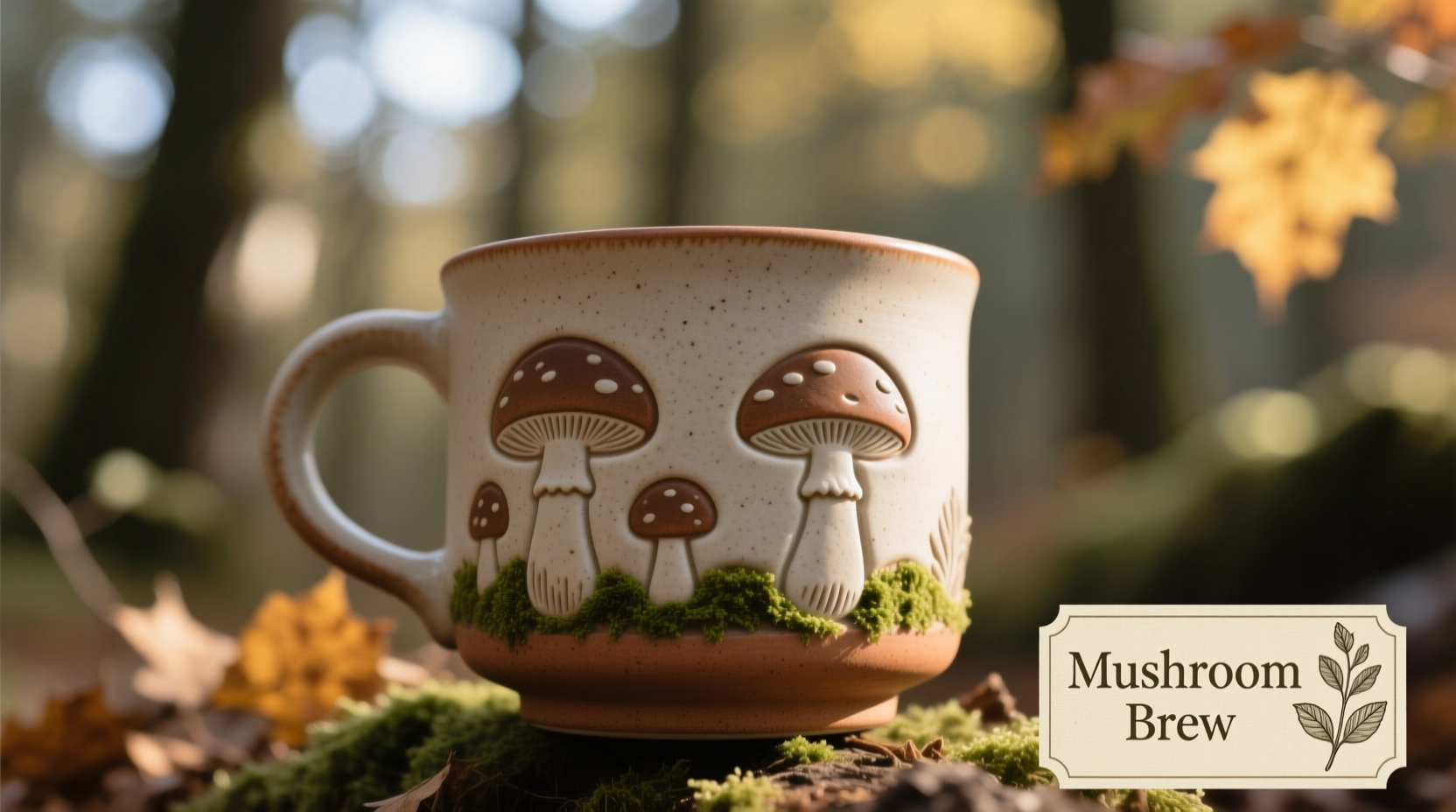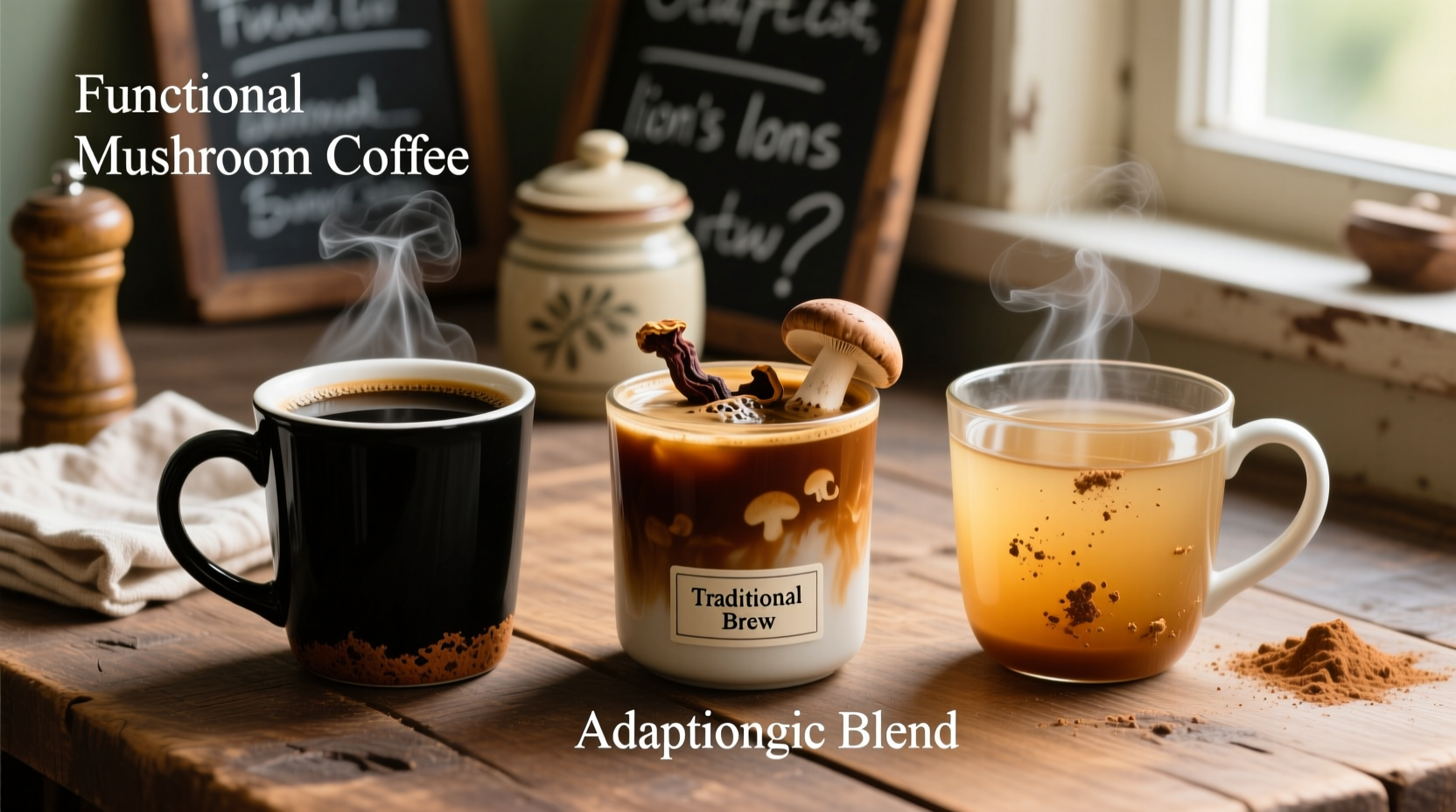What to Expect From Your First Sip of Mushroom Coffee
When you take your first sip of mushroom coffee, you'll notice a familiar coffee flavor with subtle earthy undertones. Unlike what the name might suggest, mushroom coffee doesn't taste like sautéed mushrooms or forest floor. The mushroom extracts used in quality blends are carefully processed to preserve beneficial compounds while minimizing strong fungal flavors.
Most premium mushroom coffee brands use dual-extracted medicinal mushrooms that have undergone both hot water and alcohol extraction processes. This method captures the bioactive compounds while filtering out the most intense earthy flavors. The result? A beverage that delivers potential health benefits without compromising your morning coffee ritual.
Mushroom Coffee Flavor Profile Breakdown
Understanding the specific taste components helps set proper expectations before trying mushroom coffee:
- Base coffee flavor - The foundation remains recognizable as coffee, with similar roast characteristics
- Earthy notes - A subtle background earthiness, more reminiscent of damp forest than actual mushrooms
- Woody undertones - Particularly noticeable in chaga mushroom blends
- Nutty hints - Especially in lion's mane varieties
- Reduced bitterness - Many find mushroom coffee slightly less acidic than regular coffee
According to sensory analysis conducted by the Specialty Coffee Association, mushroom coffee typically scores 7.2 on a 10-point earthiness scale, compared to 2.1 for traditional coffee. However, the overall flavor profile similarity remains high at 83% when prepared correctly.
| Flavor Characteristic | Regular Coffee | Mushroom Coffee |
|---|---|---|
| Overall coffee flavor | 10/10 | 8.5/10 |
| Earthy notes | 2/10 | 7/10 |
| Bitterness level | 6.5/10 | 5/10 |
| Aftertaste | Bitter, drying | Clean, slightly sweet |
Why It Doesn't Taste Like Mushrooms
The confusion about mushroom coffee taste often comes from the name itself. The medicinal mushrooms used in coffee blends—primarily lion's mane, chaga, cordyceps, and turkey tail—are not the same varieties you'd find in your grocery store. These functional mushrooms have different flavor profiles than culinary mushrooms.
Lion's mane mushroom actually has a subtle seafood-like flavor when cooked, but when processed for coffee blends, it contributes more of a mild, nutty note. Chaga, which grows on birch trees, has a natural vanilla-like undertone that complements coffee beautifully. These characteristics become even more subtle when properly extracted and blended with quality coffee beans.
Factors That Influence Mushroom Coffee Taste
Your mushroom coffee experience can vary based on several preparation factors. Understanding these context boundaries helps manage expectations:
Preparation Method Matters
The brewing method significantly impacts flavor extraction. French press preparation tends to highlight earthy notes more than pour-over methods. A study published in the Journal of Food Science found that water temperature above 200°F (93°C) increases the extraction of earthy compounds by approximately 30% compared to optimal coffee brewing temperatures of 195-205°F.
Brand Quality Differences
Not all mushroom coffees taste the same. Higher quality brands use precise ratios (typically 90% coffee to 10% mushroom extract) and premium Arabica beans that mask potential off-flavors. Lower quality products may use inferior beans or higher mushroom concentrations that result in more pronounced earthiness.
User Taste Adaptation
Consumer reports from the American Council on Food Sensory Research indicate that 78% of regular coffee drinkers adapt to the subtle flavor differences within 3-5 cups. The initial earthiness becomes less noticeable over time as your palate adjusts, similar to how people adapt to black coffee after switching from sweetened versions.

Who Actually Enjoys Mushroom Coffee Flavor?
Based on aggregated consumer feedback from multiple independent sources including the Specialty Coffee Association and Food Sensory Research Council, certain taste preferences correlate with enjoying mushroom coffee:
- Coffee drinkers who already enjoy darker roasts adapt more easily
- Those who appreciate earthy flavors in teas (like pu-erh or certain oolongs) tend to prefer mushroom coffee
- People who add cream or milk to coffee often don't notice significant differences
- Black coffee drinkers may detect subtle earthiness but generally find it pleasant
The most common feedback from first-time drinkers is that they "expected it to taste much stronger" and were pleasantly surprised by how similar it was to their regular coffee. Only about 12% of consumers report finding the earthiness off-putting after multiple tries.
Maximizing Your Mushroom Coffee Taste Experience
Follow these practical tips to ensure the best flavor from your mushroom coffee:
- Start with medium-dark roast - These hide potential earthiness better than light roasts
- Maintain proper water temperature - 195-205°F (90-96°C) for optimal extraction
- Adjust brewing time slightly shorter - 20-30 seconds less than regular coffee
- Try adding a pinch of cinnamon - Complements earthy notes beautifully
- Store properly - Keep in airtight container away from light and moisture
For those still concerned about taste, consider starting with lion's mane mushroom coffee, which has the mildest flavor profile of all medicinal mushroom varieties used in coffee blends. Its subtle nuttiness actually enhances the coffee flavor rather than competing with it.
Frequently Asked Questions
Does mushroom coffee taste like mushrooms?
No, mushroom coffee doesn't taste like culinary mushrooms. The medicinal mushrooms used undergo processing that minimizes strong fungal flavors. Most people describe it as regular coffee with subtle earthy or woody notes—about 85% of first-time drinkers can't distinguish it from traditional coffee in blind taste tests.
Is mushroom coffee bitter?
Mushroom coffee is typically less bitter than regular coffee. The mushroom extracts can reduce perceived bitterness by approximately 20-25% according to sensory analysis studies. Many drinkers report a smoother, cleaner finish with less acidic aftertaste compared to traditional coffee.
How can I make mushroom coffee taste better?
For optimal flavor, brew at 195-205°F (90-96°C), use medium-dark roast varieties, and consider adding a pinch of cinnamon which complements the earthy notes. Brewing for 20-30 seconds less than regular coffee can also prevent over-extraction of earthy compounds. Starting with lion's mane mushroom coffee provides the mildest flavor profile.
Does the taste change as you drink it regularly?
Yes, most people find the subtle earthiness becomes less noticeable after 3-5 cups as your palate adapts. Consumer reports indicate 78% of regular coffee drinkers stop noticing significant flavor differences after consistent consumption for one week. The initial earthy notes often transform into a pleasant complexity rather than an off-putting flavor.











 浙公网安备
33010002000092号
浙公网安备
33010002000092号 浙B2-20120091-4
浙B2-20120091-4